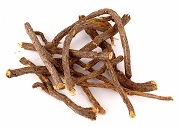Licorice Inhibits Replication of Coronavirus
During the COVID-19 pandemic, social distancing and hygiene seem to be having some effect on "flattening the curve" and slowing the spread of the virus. The use of ultraviolet (UV) light to decontaminate medical facilities, proper hand-washing and disinfectants, equipment and even protective facemasks also seems to be useful. But people will still contract COVID-19, and effective treatments are lacking and needed. That’s why some scientific studies are looking at a natural product that has long been known to have antiviral effects1 – glycyrrhizin, the major active constituent in licorice root. Glycyrrhizin was valued in ancient Arabia and Greece for treating coughs and in China for relieving irritation of the mucous membranes. In modern times, glycyrrhizin has been shown to be a formidable antiviral, fighting herpes, HIV, hepatitis, influenza, encephalitis and pneumonia as well as less known viruses like respiratory syncytial virus, arboviruses, vaccinia virus and vesicular stomatitis virus. Still, it’s glycyrrhizin's effectiveness against SARS (severe acute respiratory syndrome) that has scientists hoping this important natural substance may be a tool against COVID-19.





